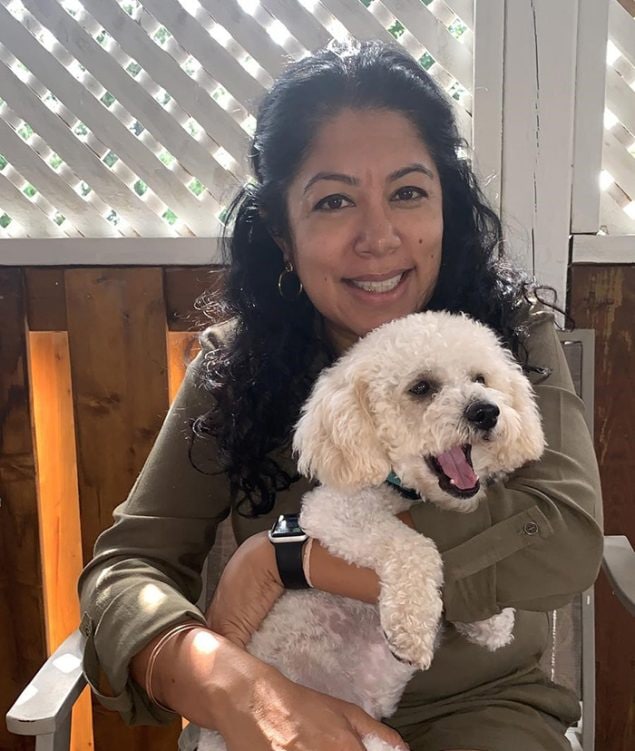Real Stories from People Living with Thalassemia – Radhika Sawh
Radhika Sawh

“I have worked hard my entire life to not let thalassemia define me or prevent me from living my life to its fullest.”
These are words spoken by Radhika Sawh, a woman born with beta thalassemia major, one of the transfusion-dependent forms of the blood disorder thalassemia. Radhika’s spirit and determination have enabled her to face the many challenges presented by thalassemia—starting with the need for regular blood transfusion. Radhika’s thalassemia causes her body to make defective hemoglobin, the component of red blood cells that carries oxygen to the body. Without that oxygen, a life-threatening anemia forms, and so Radhika requires red blood cell transfusions regularly.
Radhika began what would become a lifetime of blood transfusions when she was 18 months old. “At first, I received less than 1 unit (approximately 1 pint) of blood cells, because I was so small,” she says. “But by the time I was 3 years old, I needed 2 full units every 2 months. And as I became older and continued to grow, my blood requirements also increased. By age 4, I needed blood every 6 weeks, and by age 6, every month. During high school, I required blood transfusions every 3 weeks, and by the time I was in my mid-20s, I needed blood every other week.” Radhika once figured out that by the time she was 45 years old, she had received more than 1,500 units of blood!
Radhika was fortunate to be diagnosed with thalassemia right after she was born, so that her doctors could monitor her and know when to begin transfusions. One reason that she was diagnosed properly was because her older brother was born with thalassemia as well. Unfortunately, Radhika never knew her brother. He passed away at age 7, just 3 months before Radhika was born.
But her brother’s experience with thalassemia also influenced Radhika’s life beyond her early diagnosis. Radhika is a board-certified genetic counselor who gathers personal and family health information from people and helps them understand their personal risk of having genetic conditions (such as thalassemia). In this role, Radhika empowers others with information to help them make informed decisions about their health.
“I was inspired to pursue this career based on my parents’ experience with my older brother’s diagnosis with thalassemia major,” Radhika explains. “They were under the impression that because they already had one child with thalassemia major, their next child would not be at risk. They were devastated when soon after I was born it became clear that I also had thalassemia major, the disease which had only months before taken the life of their firstborn. A visit with a genetic counselor would have ensured my parents understood that because they were both carriers, they had a one in four chance with each pregnancy of having a child with thalassemia major.”
Despite her need for regular transfusions, Radhika was able to go to college, continue her education in graduate school, and enjoy a fulfilling career. She also is married and has a daughter who is herself now in college. These options are now more common for people with thalassemia than they once were.
“When I was growing up, I didn’t know anyone with thalassemia older than 30 years of age, let alone anyone who was married and had children,” Radhika says. “Today, that’s all changed. And there have been advances in treatments that lessen the amount of blood that some people with thalassemia need. FDA recently approved the first cell-based gene therapy to treat people with transfusion-dependent beta thalassemia.”
Radhika is thrilled to see so many changes in thalassemia management and treatment occurring during her lifetime and to realize how different things are now. When asked what advice she has for others with thalassemia, Radhika responded, “Having thalassemia is not a death sentence. Most people with this blood disorder are able to lead full lives, pursue careers, and have families of their own. It all depends on how you manage your disorder. You will have to learn to plan your life around your transfusions, stay on top of your chelation (taking medicine to remove excess iron before it builds up in the body’s organs) and advocate for yourself, but as long as you do, you can live the life you want, without limitations.”
Despite all she has accomplished, Radhika acknowledges that one thing hasn’t changed: the need for regular blood transfusions. “I wish more people who are eligible to do so would donate blood,” she says. “It is very scary for people like me who depend on blood transfusions to hear about blood shortages, because this can mean life or death for us. So, if you are able, please consider donating blood!” Learn more about blood donation at the American Red Cross.
CDC thanks Radhika for sharing her personal story.
